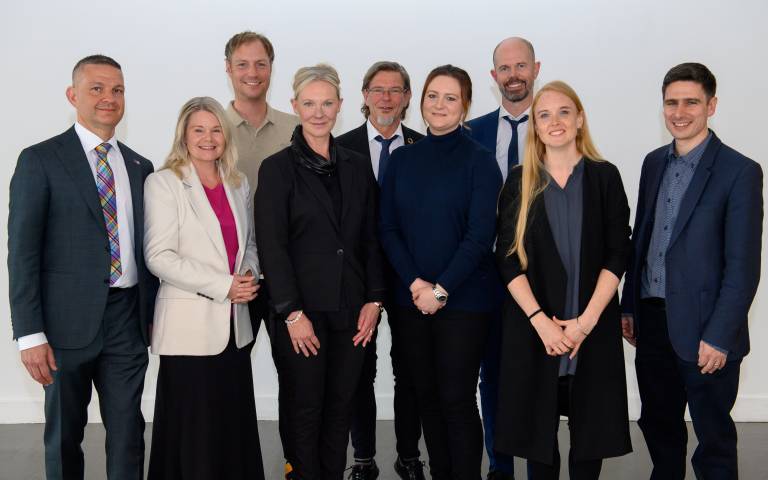UCL researchers are to partner with RISE, Research Institutes of Sweden, to explore how the human brain interacts with built environments, and how understanding this can help design sustainable surroundings that enhance people's health and wellbeing.

Academics from UCL's Faculty of Brain Sciences and The Bartlett Faculty of the Built Environment signed a new Memorandum of Understanding with RISE colleagues on 16 May 2024 outlining their plans to work together across these interdisciplinary fields.
Together they aim to identify specific risk and resilience factors in architecture and design, and how these impact cognition, behaviours, and emotions in their inhabitants, to help shape future living environments and positive outcomes.
The initiative is a direct example of the new bilateral innovation and research agreement between Sweden and the UK, focusing on a shared commitment to outstanding scientific research and sustainable development.
Professor Hugo Spiers, Vice-Dean for Enterprise in UCL Brain Sciences said: "New UCL facilities for simulating real environments (e.g. UCL PEARL*) and mobile brain recording make it possible for us now to gain a much richer understanding of how the human brain is impacted and supported by the built environment. Working with RISE will enable us to connect these new research tools with innovations in implementation of health and sustainable environments, to improve human health and wellbeing."
Dr Fiona Zisch (UCL The Bartlett School of Architecture) added: "The arts, humanities, and design fields have a rich history of intersecting with and being informed by relevant disciplines studying mind, brain, and body. Twentieth century interdisciplinary work across architecture, design, technology, and the brain sciences has already yielded substantial knowledge which is now being expanded further into transdisciplinary research that integrates further fields of study and more ecologically rich approaches. This is and will be enabling further insights and innovations, leading to more diverse and inclusive understandings of the interplay between different environments and their inhabitants."
RISE is the Swedish research institute and innovation partner for every part of society, collaborating internationally across industry, academia and the public sector.
The new initiative brings together the diverse expertise and innovative culture of Sweden and the UK, illustrating their shared dedication to outstanding scientific research and sustainable development.
Sweden's reputation as a pioneer in adopting and implementing innovative solutions complements the UK's strong research infrastructure. Our groundbreaking laboratories, emphasising interdisciplinary research across neuroscience, architecture and psychology, will help to cultivate a comprehensive understanding of how the built environment influences health and wellbeing.
Carina Carlman, Director of Research and Business Development at RISE, said: "By deepening the understanding of NeuroArchitecture and NeuroDesign, we can identify keys and tools to shape future living environments in a way that supports health and wellbeing. We address these challenges by collaborating for providing new insights into how conscious design choices can help balance risk and resilience factors, promoting healthier living on a global scale."
The team's work is strongly aligned with the United Nations' Global Goals, which focus on human, ecological and economic sustainability. Through their joint vision to address urgent challenges by offering new perspectives on how conscious design choices can better balance risk and resilience factors in the built environments, they hope to contribute to healthier living environments for people and planet.
*Person Environment Activity Research Laboratory, London






